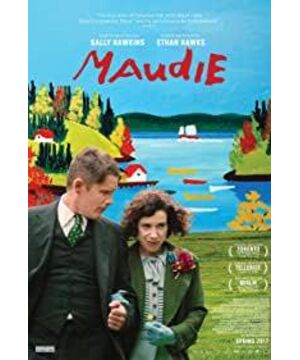Mo Di's life was tragic. She suffered from arthritis since childhood. After her parents died, her only brother sold the house left by her and left Mo Di to her aunt to take care of her. At the aunt's place, she was disliked and humiliated. . Then, by chance, she became Everett Lewis' servant and left her aunt's house. In their life with Everett, a fishmonger, the two gradually developed feelings and entered into marriage. It was also during this period that Mo Di continued to paint in her spare time. She met Sandra, and her paintings began to be appreciated. It was also Sandra who made Mo Di start selling paintings, and eventually her paintings became famous.
The plot of this movie is not complicated, it is a linear narrative, it takes Mo Di's life as the main line, and focuses on depicting her emotional life with Everett. On the other hand, in terms of cinematography, the film gives me a sense of balance, soft lighting, bland editing, and quiet but not much music. Photography mostly captures the beauty of the countryside, with open outdoors and soft indoors, creating a sense of harmony as a whole.
What makes this film so moving is its successful characterization, its capture of small details, and its understated, unintentional sensationalism.
The two main characters are Mo Di and Everett. As marginalized people in society, the characters of these two people are not complicated. The director poured a key word into each of these two characters: Mo Di's purity, Everett's sense of self-esteem. The pure aspect of Mo Di is reflected in her docility. She is born disabled but extremely friendly to others. On her way to the Everett house to apply for a helper, the camera shows us how kind he treats passers-by. In the dialogue that follows , Mo Di confessed to Everett that she was often discriminated against and treated rudely by children. The comparison of these two aspects makes Mo Di's gentleness and kindness deeply rooted in the hearts of the people. On the other hand, Mo Di's pureness is reflected in her love for life. The simple and beautiful things in her paintings are the most vivid embodiment of her love for life. Everett's sense of self-esteem is the source of his frequent irony. This sense of self-esteem makes him look nasty, but in the next shot we get to see how cute he is. Keeping the income earned by Mo Di from selling paintings, and Sandra's business, warned Mo Di that he was the person in charge. Mo Di's suppressed emotions erupted into anger after he became famous, but in comparison with Mo Di, he loss of self-esteem. In terms of character creation, we not only want to thank the director for his ability to grasp the emotions of the characters, but also thank the two actors Ethan Hawke and Sally Hawkins for their excellent performances. The two aspects of the blending of water and milk make these two characters deeply rooted in the hearts of the people.
There are many charming little details in the movie. Mo Di entertains herself alone in the club; the dance after the two become husband and wife, Mo Di steps on Everett's feet; When selling his unfinished works, the panicked expression of anxious crying; after Mo Di died, Everett packed the paintings into the room and so on. These charming details play an immeasurable role in shaping the characters. Through external performance, we can easily enter the inner world of the characters, and the emotional appeal is extremely strong.
It is precisely because of the strong appeal of the details that the director's sensational methods are superb, unlike the simple and direct emotional catharsis in many movies. In the movie "Mo Di", we can hardly see the tears of the characters, and the only few drops are only faint. Similarly, we can't hear loud music, only quiet music that sounds occasionally. Unintentional is more emotionally shocking than deliberately provocative, and the duration is stronger. This is a wonderful touch of the director.
Put aside the subjective analysis of the film, talk about my subjective feelings. Mo Di doesn't have high requirements for life. After being abandoned by her brother and humiliated at her aunt's house, what she requires is to be self-sufficient and unwilling to rely on others. After becoming Everett's servant, with the ability to support herself, all she asks for is respect from others. Her paintings are a kind of emotional sustenance and a strong yearning for beauty, and the sale of the paintings gave Mo Di a chance to be respected by Everett. In Mo Di's life, she never She hoped that she could be famous far and near, she just lived as a marginal person, and being respected by others was her biggest dream in her life. After becoming famous, Mo Di was happy because almost everyone started to respect her, and she had already obtained what she wanted. On the other hand, she was also flustered, because it was something beyond her hope, and it was given to her by life. Surprise, so she still lives as before, without more desire, she is almost indifferent to honor, whether it is on TV in the newspapers or Vice President Nixon's purchase of his paintings, she speaks plainly Come out, the reason for being happy is simply to gain respect, simple and pure.
In real life, what we lack is this purity of Mo Di. We are always craving more, seeking more, and it is difficult to be satisfied, so it is difficult to obtain peace. We are always happy or sad because of gains and losses, and ugly jealousy because of others' gains. The possession of money is always endless, and fighting for money and honor is an unstoppable war. We love Mo Di, precisely because we are not Mo Di.
View more about Maudie reviews











